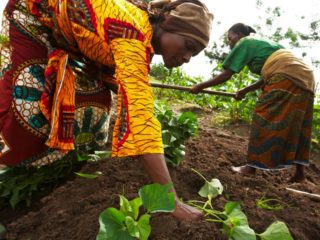Experts advocate broader inclusion in agric budgeting
Economic and agricultural experts
have called for broader inclusion of stakeholders in the formulation and
implementation of budgetary allocation for the agricultural sector to engender
economic growth and national development.
Mr Aso Patrick Vakporaye, Assistant
Director Economic Growth Department Ministry of Budget and National Planning; Barrister
Eze Onyekpere, Lead Director Centre for Social Justice (CSJ) and Azubike
Nwokoye, Food and Agriculture Programme Advisor, ActionAid Nigeria (AAN) gave
the advice in Kaduna.
They spoke at the “Stakeholders
Consultative Meeting on 2018 Agriculture Budget” organised by the Action Aid
Nigeria (AAN) and the Ministry of Budget and National Planning (MBNP).
The meeting which was first held
in 2016 was, among others, convened to facilitate conversations among key
stakeholders connecting the continental framework on the Comprehensive Africa
Agriculture Development Programme (CAADP) targets and government intentions
within the Agriculture Promotion Policy (APP).
Vakporaye who spoke on the Medium
Term Sector Strategy (MTSS), Planning and Budgeting Processes in Nigeria: The
Need for the increased participation of all levels of stakeholders in the
Agriculture Sector, said a major improvement to the planning and budgetary
process in the form of transparency by the ministry was the introduction of
stakeholders to have a say on how the budget is put together, and making it
more open to the public.
“Presently, there is no such
formal mechanism in the country that invites citizens to participate in the
budgeting process. In the agriculture sector, smallholder farmers, especially
women and advocacy stakeholders (CSOs), have not been involved sufficiently in
the consultations. The esoteric language and presentation style of the budget
documents prevent the public from understanding the real content and importance
of the documents.
“Even the legislators who are
supposed to influence the budget do not possess the skills and information that
would enable them to engage in a critical discourse of the matter. Also, the
role of civil society organisations is limited due to the lack of databases and
information,” Vakporaye said.
On his part Onyekpere speaking on
the Agriculture Promotion Policy (APP) and the Agriculture Economic Recovery
and Growth Plan (ERGP), said that while the APP is a sectoral policy, the ERGP
is overall broad policy framework that covers the field and can only reflect the
key principles of the APP in its agriculture provisions.
“Thus, it needs not be as
detailed as the APP. However, the framework of the ERGP must be broad enough to
accommodate the specifics of the APP,” he said.
According to him, Agriculture is
central to the pillars of ERGP for 2020 and that restoring growth will involve
the improvement of agricultural productivity and utilization, and conversion of
agriculture commodities into finished valuable product.




Comments
Post a Comment